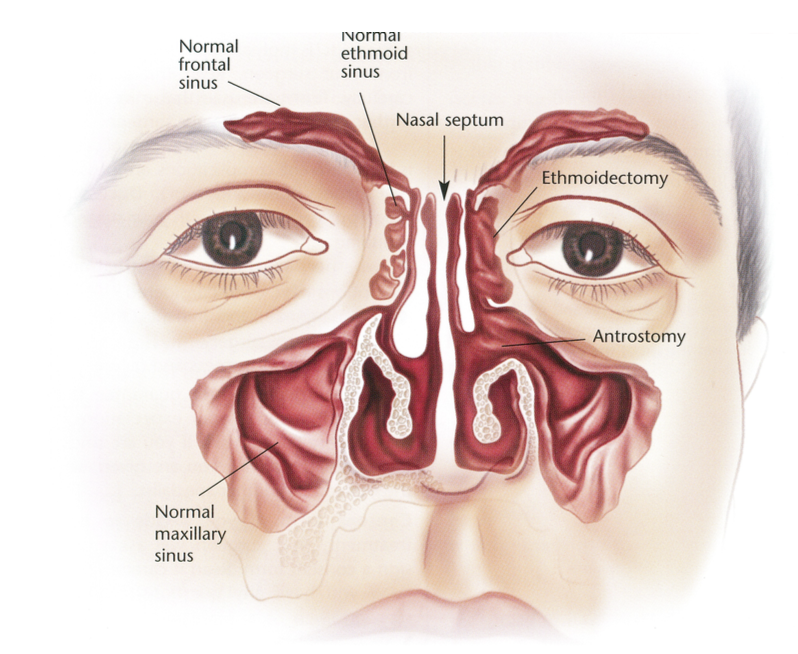Fast Facts
Surgery doesn’t cure rhinitis and allergy, most people still need to use steroid nasal spray before and after surgery.
Take 2 weeks off to recover.
Stay within one hour of a hospital for 2 weeks after surgery in case bleeding occurs.
Rinsing with saline four times a day for 6 weeks is the most important thing to get a good outcome.
What is this for? Is it effective?
Sinuses are air spaces inside the bones of the face, in the cheeks, forehead and between the eyes. The purpose of sinuses are unknown. The sinuses contain air and open into the side wall of the nose through narrow openings or channels called ostia.
If the lining of the nose is swollen and inflamed (rhinitis), the sinus openings can become blocked and this leads to sinusitis. Sinusitis can cause pain and pressure, discharge or runny nose and sometimes cough, post-nasal discharge, sore throat and loss of smell. The lining of the nose can become swollen and inflamed due to a virus/cold, allergy, irritation or other problems like nasal polyps.
Sinusitis can be
- acute and recurrent: episodes lasting a few weeks then being well for weeks or months before the next episode, or
- persistent or chronic: symptoms change from day to day, with some worse times and some better times but no completely symptom-free times.
Initial treatment for sinusitis is with medication:
- first with tablets for ten days, then
- steroid nasal sprays and saline rinses for weeks or months.
If symptoms persist after 3 months of medication, 2 tests are needed:
- CT scan of the sinuses. The shape and openings of the sinuses are unique to each person. The CT shows the shape of the sinuses and the sinus openings, which sinuses are diseased and how bad the disease is. This allows the surgeon to decide if surgery would be helpful.
- blood tests for allergy to aero-allergens, like dust mite, grass, animals.
The aim of surgery is to improve the openings into the sinuses. For mild disease, minor adjustments are needed and for more severe disease (chronic rhinosinusitis with nasal polyps) more extensive surgery is needed.
Sinus surgery is done through the nostril with cameras (endoscopic or key hole), so you don’t look any different on the outside. Some patients with severe disease need to have small cuts in the skin of the eyebrow (for frontal or forehead sinus surgery) or in the gum inside the mouth (for the maxillary sinus).
Surgery doesn’t cure polyps or allergy; it is part of the treatment along with medication. Medication is needed before and after surgery. Most people have improvement in symptoms for at least 12 months after surgery. 7 out of 10 people have long term improvement and 3 out of 10 people have problems again.
If you also have blocked nose, you may need nasal airway surgery at the same time as sinus surgery. Watch the video below or see septoplasty and turbinoplasty for information about this surgery.
For more information about rhinitis, sinusitis and polyps see:
https://www.allergy.org.au/patients/allergic-rhinitis-hay-fever-and-sinusitis

